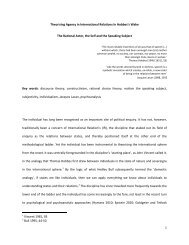biological sciences HONOURs 2014 - The University of Sydney
biological sciences HONOURs 2014 - The University of Sydney
biological sciences HONOURs 2014 - The University of Sydney
Create successful ePaper yourself
Turn your PDF publications into a flip-book with our unique Google optimized e-Paper software.
32<br />
ANIMAL-PLANT<br />
INTERACTIONS<br />
Research Interests<br />
My research explores the ecological interactions <strong>of</strong> herbivores<br />
with plants and predators: how herbivores, particularly<br />
marsupial herbivores, solve the problem <strong>of</strong> eating without<br />
being eaten, how plants defend when they can’t escape and<br />
how the fear <strong>of</strong> predators (i.e. predation risk) modifies these<br />
interactions. By studying plant-herbivore interactions and<br />
behavioural ecology in this context, we can understand how<br />
and why herbivores make the foraging choices they do, and<br />
what the ecological (and evolutionary) implications are for both<br />
plants and predators – as well as for themselves.<br />
Honours projects<br />
1. Determine foraging responses <strong>of</strong> mammalian herbivores<br />
(swamp wallabies, brushtail possums) or omnivores (bush<br />
rats) to plant toxins and predation risk (in collaboration with<br />
Associate Pr<strong>of</strong>essor Peter Banks)<br />
2. Define ecologically-relevant personality traits <strong>of</strong><br />
mammalian herbivores or omnivores and determine how<br />
they shape foraging decisions (in collaboration with Associate<br />
Pr<strong>of</strong>essor Peter Banks)<br />
Associate Pr<strong>of</strong>essor<br />
Clare McArthur<br />
Room 303, Heydon-<br />
Laurence Building A08<br />
T: (02) 9351 2062<br />
E: clare.mcarthur@<br />
sydney.edu.au<br />
3. Quantify how abiotic factors (wind, nutrients, shade and<br />
dust) alter plant chemistry and structure and hence alter interactions with mammalian and<br />
insect herbivores (in collaboration with Associate Pr<strong>of</strong>essor Dieter Hochuli)<br />
<strong>The</strong>se projects can involve considerable field work in regional National Parks, some lab work<br />
including the chemical analysis <strong>of</strong> plants, and analyses <strong>of</strong> animal behaviours obtained from<br />
camera videos. A driver’s licence is generally essential.
















